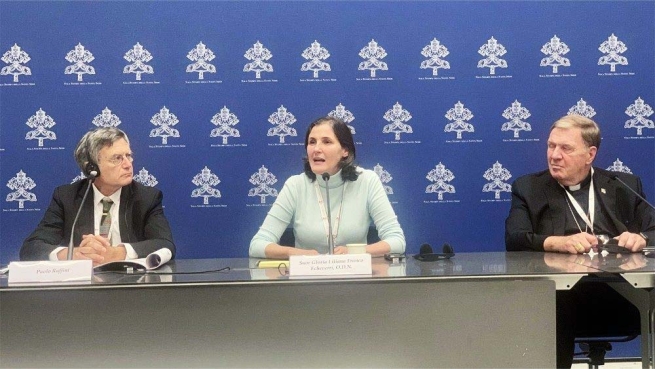The true beauty of the Catholic Church “becomes evident when its doors are open and welcome people. We hope that the Synod will help us open them even more.” That is how Cardinal Tobin, the Archbishop of Newark, described the theme of the second module of the Instrumentum çLaboris. The module is focusing on the theme: “A communion that radiates: How can we be more fully a sign and instrument of union with God and of the unity of all humanity?” which was discussed in small groups Monday afternoon and Tuesday morning.
Cardinal Tobin was speaking at the press briefing on the work of the assembly, which was led by the president of the Commission for Information, Dr. Paolo Ruffini, Prefect of the Dicastery for Communication.
In the small working groups, participants in the General Assembly discussed education, the environment, multiculturalism and walking with the marginalised and migrants. On Monday, they elected the members of the Commission for the Synthesis Report and those of the Commission.
The small groups, which were organized on the basis of the themes being dealt with, discussed the subsections of Module B1 dedicated to communion, and presented their reflections in the fifth General Congregation on Tuesday afternoon and in the sixth and seventh congregations on Wednesday.
Responding to journalists’ questions, Dr. Ruffini emphasised that in this, his third Synod, members have many more opportunities to speak, especially in the small groups.
“There is a great sharing among all the participants, according to my personal experience,” he said, “which began with the pre-synodal retreat.”
Responding to a question about the assembly being directed from the top down, Cardinal Tobin said he was “confident, because things are not coming to us from above, but it is a process that starts from the bottom, from the involvement of the People of God, and arrives at the top. I do not feel constrained or handcuffed.”
In addition to Cardinal Tobin, a Redemptorist religious and member of the Ordinary Council of the Secretariat of the Synod, the briefing was also attended by Sister Echeverri, a Colombian religious of the Order of the Company of Mary Our Lady, and a witness to the Synod Process. Sheila Leocádia Pires, secretary of the Synod Information Commission, also spoke.
Sr. Echeverri emphasised that among the participants in the 16th Ordinary General Assembly of the Synod of Bishops, there is a desire to live like Jesus “who humanises, who dignifies, who includes, Jesus who opens the door to the other.”
It is a process “that sees a different method, starting with conversion in the Spirit. In our smaller circles we recognise precisely this common dignity, a dignity that springs from respect, communion, mutual recognition.”
In the discussion on the current module, “resounding in our hearts is the call to listen to the cry of the poor. At our table, the face of the poor, migration, people trafficking, social exclusion in the peripheries resounded loudly.”
Cardinal Tobin, who is in the same circle as Sr. Echeverri, explained that a young woman from Russia, a mother from Ukraine, a Pentecostal pastor from Ghana, a theologian from Malaysia, and the coordinator from Singapore were also in the group.
“It is an optimal situation for me,” he commented, “to be in such a diverse group and to be able to listen to others."
This, he said was fascinating for him, having grown up in Detroit in a multicultural environment, and who as a priest for 45 years has lived “in cultures that weren’t my own, at least the one iI was raised in.” He described this as "the most diverse Synod I’ve ever participated in.”
Cardinal Tobin also shared a concrete pastoral experience, the reception in Newark Cathedral of “a pilgrimage of people who felt marginalised because of their sexual orientation.” He recalled a presentation given by a priest, who told the group: "This is a beautiful church, but it is most beautiful when its doors are open."
That, he said, was an experience of an open Church. And he concluded that in a world characterised by exclusionary nationalism, by xenophobia, in which there are leaders who are committed to building borders, the Church's option is that of fraternity, of synodality, an option that enables us to understand that we are all brothers and sisters.
"In a Church in which we see ourselves as brothers and sisters," he said, "there is room for everyone.”
Source: Vatican News


